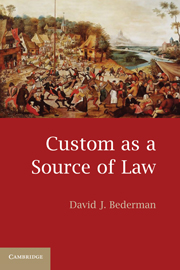6 - Property
Published online by Cambridge University Press: 05 June 2012
Summary
As already suggested in the last chapter, the canonical divide between private and public law subjects has always bedeviled much thinking about customary law. As a set of doctrines, family law combines elements of both, and, as just discussed, customary regimes can continue to exert a powerful pull in those jurisdictions where indigenous marital and succession practices were recognized and accepted. So, too, with property law. Very sophisticated contemporary legal systems – most notably those of Australia and the United States – have embraced group title to property, premised on ostensibly indigenous practices, institutions, and procedures. In this respect, common-law systems have sometimes been more receptive of property rights based on indigenous custom, than they have with family statuses and relationships grounded on the same source of law.
Unlike in family law, common law has, since medieval times (see Chapter 3), incorporated local customs as an element affecting property use, particularly of commonages. Unwritten and unrecorded customary servitudes continue to exist and be judicially enforced, even in U.S. jurisdictions. Perhaps as an unintended effect of jurisprudence construing the United States Constitution’s property rights and due process guarantees, customary land rights have emerged as a divisive issue. At stake is nothing less than the essential character of customary norms: though inchoate, are they binding from the moment of their adoption by the relevant community concerned, or must they be statutorily codified or judicially recognized before being constitutionally enforced?
- Type
- Chapter
- Information
- Custom as a Source of Law , pp. 68 - 79Publisher: Cambridge University PressPrint publication year: 2010



